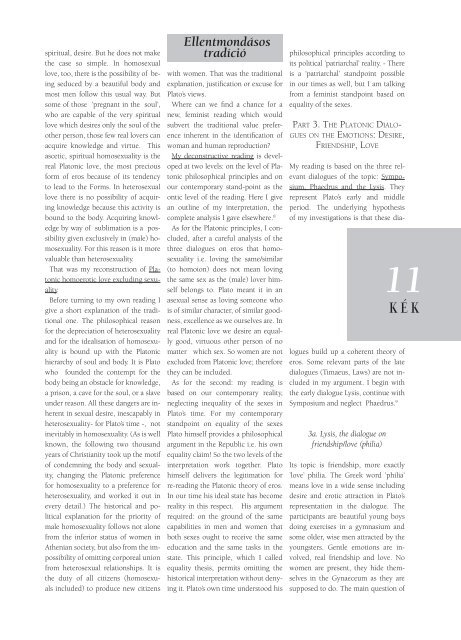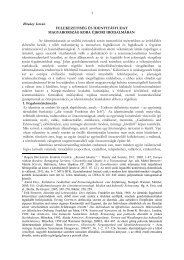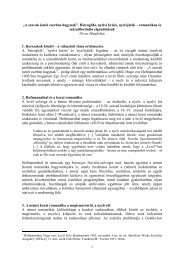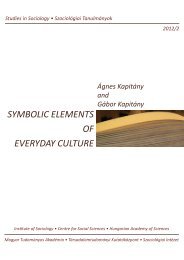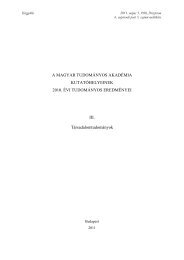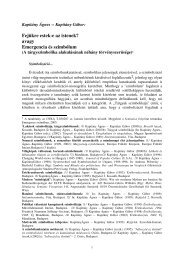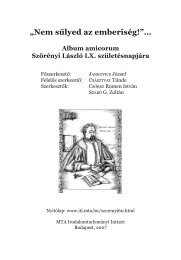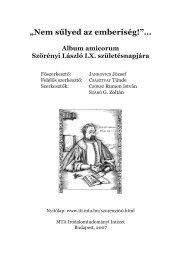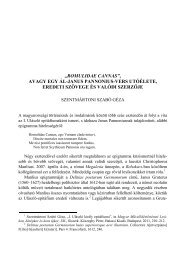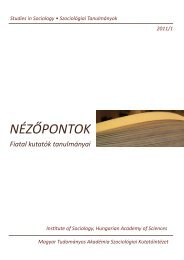pdf 1927 kb - MTA Szociológiai Kutatóintézet
pdf 1927 kb - MTA Szociológiai Kutatóintézet
pdf 1927 kb - MTA Szociológiai Kutatóintézet
You also want an ePaper? Increase the reach of your titles
YUMPU automatically turns print PDFs into web optimized ePapers that Google loves.
spiritual, desire. But he does not make<br />
the case so simple. In homosexual<br />
love, too, there is the possibility of being<br />
seduced by a beautiful body and<br />
most men follow this usual way. But<br />
some of those ’pregnant in the soul’,<br />
who are capable of the very spiritual<br />
love which desires only the soul of the<br />
other person, those few real lovers can<br />
acquire knowledge and virtue. This<br />
ascetic, spiritual homosexuality is the<br />
real Platonic love, the most precious<br />
form of eros because of its tendency<br />
to lead to the Forms. In heterosexual<br />
love there is no possibility of acquiring<br />
knowledge because this activity is<br />
bound to the body. Acquiring knowledge<br />
by way of sublimation is a possibility<br />
given exclusively in (male) homosexuality.<br />
For this reason is it more<br />
valuable than heterosexuality.<br />
That was my reconstruction of Platonic<br />
homoerotic love excluding sexuality.<br />
Before turning to my own reading I<br />
give a short explanation of the traditional<br />
one. The philosophical reason<br />
for the depreciation of heterosexuality<br />
and for the idealisation of homosexuality<br />
is bound up with the Platonic<br />
hierarchy of soul and body. It is Plato<br />
who founded the contempt for the<br />
body being an obstacle for knowledge,<br />
a prison, a cave for the soul, or a slave<br />
under reason. All these dangers are inherent<br />
in sexual desire, inescapably in<br />
heterosexuality- for Plato’s time -, not<br />
inevitably in homosexuality. (As is well<br />
known, the following two thousand<br />
years of Christianity took up the motif<br />
of condemning the body and sexuality,<br />
changing the Platonic preference<br />
for homosexuality to a preference for<br />
heterosexuality, and worked it out in<br />
every detail.) The historical and political<br />
explanation for the priority of<br />
male homosexuality follows not alone<br />
from the inferior status of women in<br />
Athenian society, but also from the impossibility<br />
of omitting corporeal union<br />
from heterosexual relationships. It is<br />
the duty of all citizens (homosexuals<br />
included) to produce new citizens<br />
Ellentmondásos<br />
tradíció<br />
with women. That was the traditional<br />
explanation, justifi cation or excuse for<br />
Plato’s views.<br />
Where can we fi nd a chance for a<br />
new, feminist reading which would<br />
subvert the traditional value preference<br />
inherent in the identifi cation of<br />
woman and human reproduction?<br />
My deconstructive reading is developed<br />
at two levels: on the level of Platonic<br />
philosophical principles and on<br />
our contemporary stand-point as the<br />
ontic level of the reading. Here I give<br />
an outline of my interpretation, the<br />
complete analysis I gave elsewhere. 8<br />
As for the Platonic principles, I concluded,<br />
after a careful analysis of the<br />
three dialogues on eros that homosexuality<br />
i.e. loving the same/similar<br />
(to homoion) does not mean loving<br />
the same sex as the (male) lover himself<br />
belongs to. Plato meant it in an<br />
asexual sense as loving someone who<br />
is of similar character, of similar goodness,<br />
excellence as we ourselves are. In<br />
real Platonic love we desire an equally<br />
good, virtuous other person of no<br />
matter which sex. So women are not<br />
excluded from Platonic love; therefore<br />
they can be included.<br />
As for the second: my reading is<br />
based on our contemporary reality,<br />
neglecting inequality of the sexes in<br />
Plato’s time. For my contemporary<br />
standpoint on equality of the sexes<br />
Plato himself provides a philosophical<br />
argument in the Republic i.e. his own<br />
equality claim! So the two levels of the<br />
interpretation work together. Plato<br />
himself delivers the legitimation for<br />
re-reading the Platonic theory of eros.<br />
In our time his ideal state has become<br />
reality in this respect. His argument<br />
required: on the ground of the same<br />
capabilities in men and women that<br />
both sexes ought to receive the same<br />
education and the same tasks in the<br />
state. This principle, which I called<br />
equality thesis, permits omitting the<br />
historical interpretation without denying<br />
it. Plato’s own time understood his<br />
philosophical principles according to<br />
its political ’patriarchal’ reality. - There<br />
is a ’patriarchal’ standpoint possible<br />
in our times as well, but I am talking<br />
from a feminist standpoint based on<br />
equality of the sexes.<br />
PART 3. THE PLATONIC DIALO-<br />
GUES ON THE EMOTIONS: DESIRE,<br />
FRIENDSHIP, LOVE<br />
My reading is based on the three relevant<br />
dialogues of the topic: Symposium,<br />
Phaedrus and the Lysis. They<br />
represent Plato’s early and middle<br />
period. The underlying hypothesis<br />
of my investigations is that these dia-<br />
logues build up a coherent theory of<br />
eros. Some relevant parts of the late<br />
dialogues (Timaeus, Laws) are not included<br />
in my argument. I begin with<br />
the early dialogue Lysis, continue with<br />
Symposium and neglect Phaedrus. 9<br />
3a. Lysis, the dialogue on<br />
friendship/love (philia)<br />
11<br />
KÉK<br />
Its topic is friendship, more exactly<br />
’love’ philia. The Greek word ’philia’<br />
means love in a wide sense including<br />
desire and erotic attraction in Plato’s<br />
representation in the dialogue. The<br />
participants are beautiful young boys<br />
doing exercises in a gymnasium and<br />
some older, wise men attracted by the<br />
youngsters. Gentle emotions are involved,<br />
real friendship and love. No<br />
women are present, they hide themselves<br />
in the Gynaeceum as they are<br />
supposed to do. The main question of


